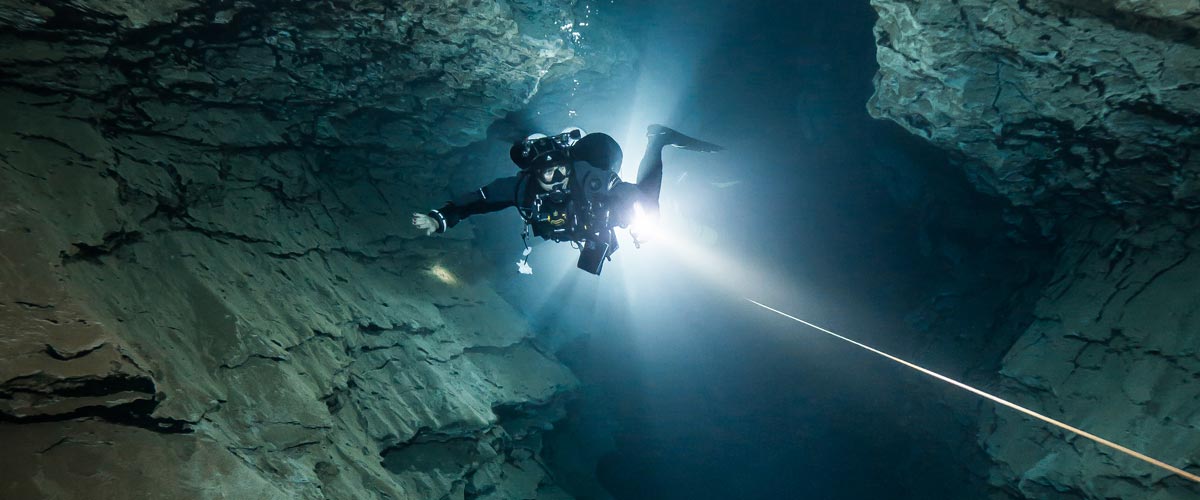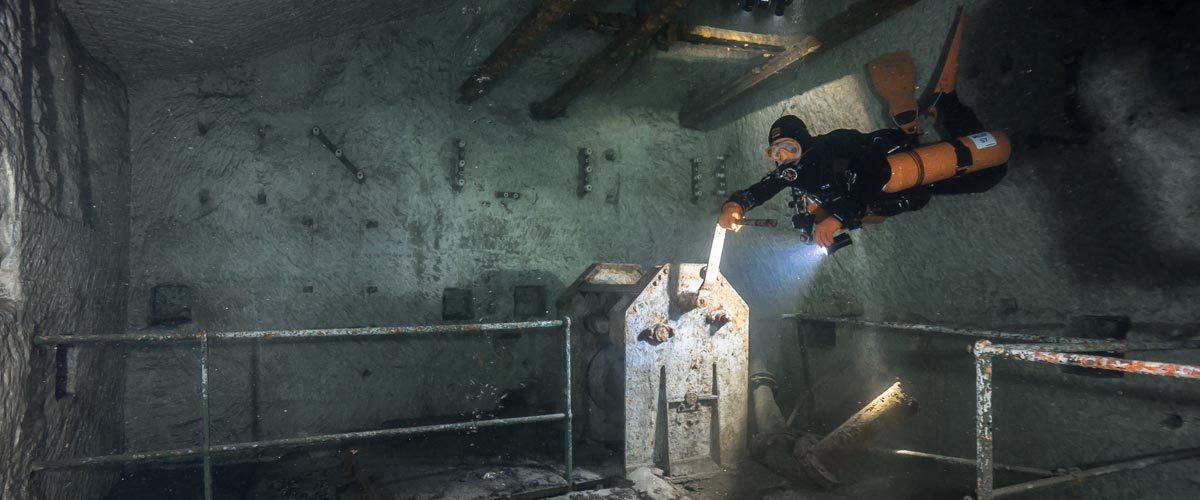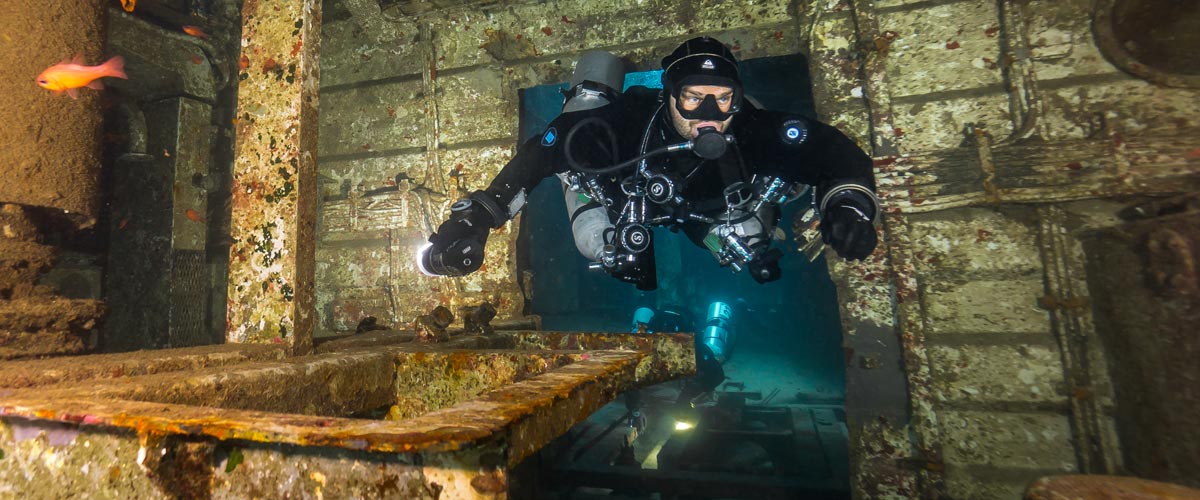Dive Training Blogs
Top 3 things to do after getting dive certified
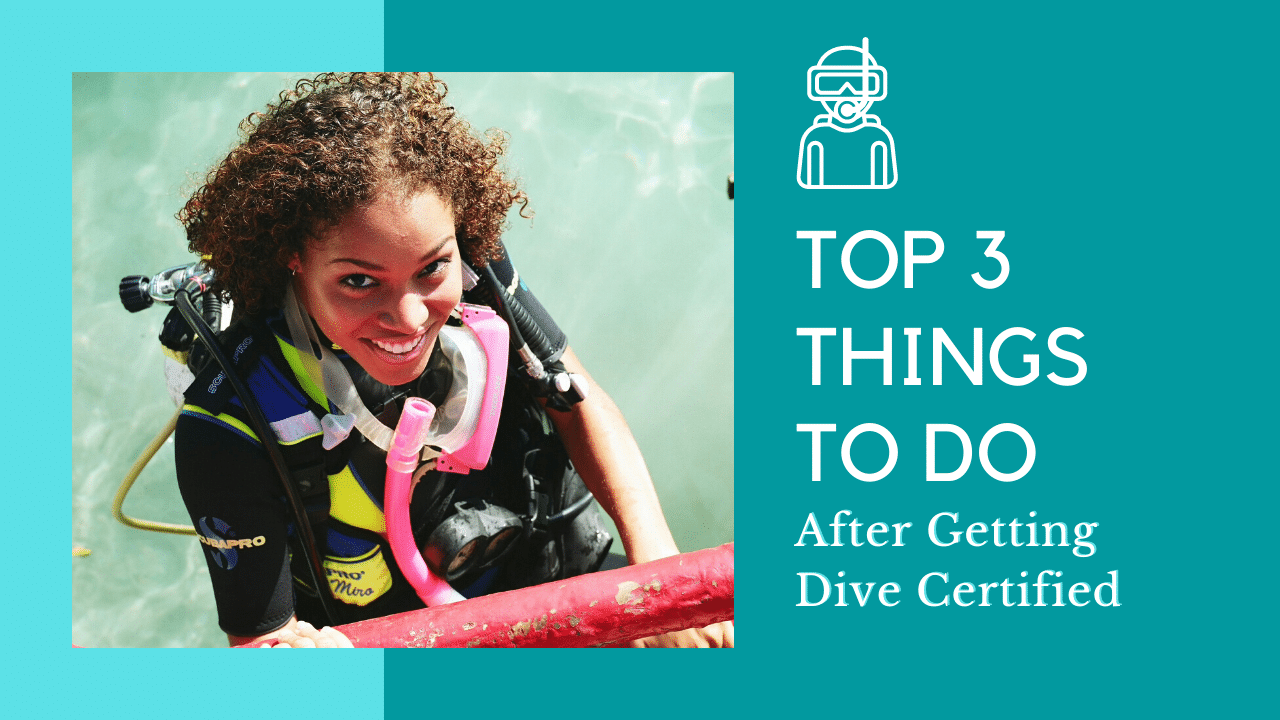
By Viviana Marcy
As a newly certified Open Water diver, figuring out the next step may seem a bit daunting or overwhelming. You just finished your class, which by no means is an easy feat. You learned concepts that are meant to help ease you into a completely new, underwater world. You also learned important skills that are absolutely essential to keeping you safe. Now, here you are, with a new scuba certification. What comes next? In my experience, there are 3 major actions that a newly-certified Open Water Diver should take in order to make the most of their certification and continue this new life below the waves.
1. Dive, Dive, Dive!
This may seem like a no-brainer, but before diving right into another certification, it’s essential to gain more diving experience and with it, comfort underwater. In my case, because of time constraints due to an upcoming internship to study whale sharks, I obtained two certifications in four days. These certifications amounted to an overload of information, and it was hard for me to take it in all at once and in such a short amount of time. Due to this time crunch, I found I missed or forgot bits and pieces of essential information and skills, making diving far more difficult and frustrating than it needed to be. Although I was eventually able to adapt and develop my newly learned scuba skills, I highly recommend spending time in the water before hopping right into the next certification class.
After getting your open water certification, find opportunities to practice and gain more experience in the water. Sign up for some dives with the facility you were certified with or nearby scuba shops. Hone your skills and become a more developed diver. You might make some lifelong friends along the way. Know that even though the Open Water certification is the “beginner cert,” you will still have the opportunity to experience some amazing dives!
2. Further Your Dive Education!
You’ve gotten more comfortable in the water and feel like your skills and experience have prepared you for the next step. You’re prepped and ready to jump right into the next thing. What should you do now? Expand your dive knowledge and move on to the next certification! It’s time to find your local dive shop or dive center and fine-tune your basic skills and learn some new ones!
An extremely helpful resource for mapping out all the possible directions to take your dive training is our SDI Course flowchart. This can be found under TDISDI’s “Courses” drop-down, labeled “View All Scuba Diver Courses.” Maybe you want to take a range of fun specialty courses, such as wreck diving, night diving, or computer nitrox diving. Or maybe you’d prefer to begin the path to becoming a Divemaster or Instructor. You could even explore entirely different diving careers such as becoming a PFI Freediver or a TDI or ERDI diver.
3. Find Your Passion In Diving!
Pursuing your dive education and finding your passion for diving go hand in hand. Once you know you’re ready to begin, you may want to ask yourself, “what am I passionate about in diving?” This is an important consideration when deciding which class to pursue. Since I graduated from college with a degree in Environmental Science, I knew I wanted to fine tune my scuba skills and focus my training on marine ecosystems. In this sense, knowing what you want to do with your dive training can help you narrow down the next step you should take.
But, what if you don’t know exactly what path you want to follow? If you are not quite sure which step you want to take, an all-around great option after achieving your Open Water certification is the SDI Computer Nitrox class. This certification does not require you to complete any additional dives and can be done just by completing an online eLearning class and a short practical with an instructor. In this course, you will learn about the benefits of breathing different gas mixtures and how to safely use nitrox with a dive computer. The biggest take away you’ll get from this course is learning about the benefits of using nitrox and how it can provide you with increased safety margins, reduced post dive fatigue, and extended no-decompression dives.
You may also want to opt for the Advanced Adventure Diver course, which is one of the best certifications to achieve after your Open Water training. This course offers an amazing opportunity to learn more important diving skills and fine tune those you’ve already learned. It also gives you the chance to choose three elective specialty courses to try out (as a side note, I highly recommend the Advanced Buoyancy control elective specialty dive. It is incredibly rewarding and it greatly enhanced the feeling of control I have in the water.) The Advanced Adventure Diver course will also require you to learn more about navigational diving as well as deep diving. One of the biggest benefits to doing this Advanced Adventure course is after you’ve completed this certification, you may have found your passion in one of the elective specialties from you’ve chosen. Additionally, the dives you completed while obtaining your Advanced Adventure certification can count towards the full certification of that specialty!
There are many options and pathways that you can take after completing your Open Water Certification. But don’t let the thrill of obtaining your cert pressure you to jump straight into the next one right away. Hone your skills, get some dives under your belt, and recognize what it is you want to gain out of diving. Apply those desires and take some classes! Based upon your personal passions, you can map out a path that is suited perfectly for you and your growing diving career.
To find out more about International Training, visit www.tdisdi.com.![]()
Blogs
Intro to Tech: What is it about?
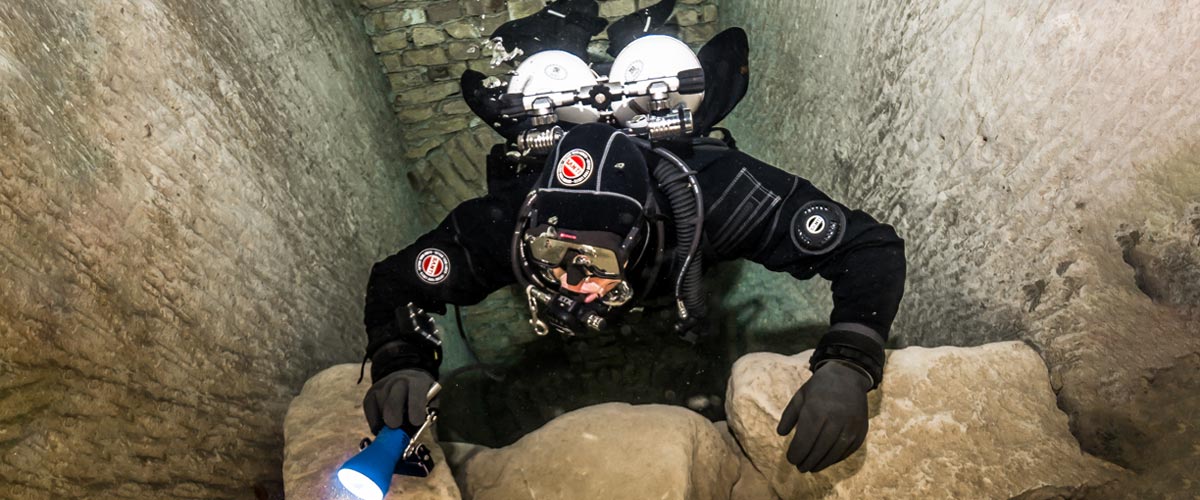
Article by José Pablo Mir
Pictures by Cezary Abramowski
The world of technical diving is exciting. It opens the door to new sites, depths, and bottom times. More importantly, it opens our minds to a new way of planning, facing, and experiencing dives, even those not purely technical.
Becoming a technical diver is a process, and like in other aspects of life, we should find the proper entry point that suits us best based on our knowledge and experience. The Introduction to Technical Diving course from TDI -the world’s largest and most recognized technical diving teaching organization- is the best option for divers who have yet to gain experience in the fundamental aspects of this new practice. The course’s content and its embrace of new techniques and technologies make it possible to acquire a solid foundation to learn and gain experience in this practice properly.
Becoming a technical diver is not something that happens overnight, whether deciding to become one or receiving a certification card stating we are now technical divers. It is a slow process extending farther away than any introductory course. It requires effort and dedication. But it will bring us satisfaction from day one -or two.
It is a matter of mentality
First, we must understand and accept that technical diving, involving greater depths, longer bottom times, exotic gases, virtual or real ceilings, and more, comes with higher levels of risk than the sport diving we have been practicing until now.
Although this discussion usually starts with a warning about risks, as I’ve done in the previous sentence, our practice is not a game of chance.
Technical diving is a rational activity that requires maturity and good judgment, and we will put everything into ensuring that each dive is a successful one -meaning we return from it safe and sound. With this understanding, we will strive to establish a mental attitude more aligned with our practice and its realities.
This new “technical diver” mindset we will develop will lead us to be more cautious in our executions, more analytical in our plans, more rational in our strategies, and more detailed in our procedures.
Experience will keep teaching us to know ourselves better, to keep our anxiety and other emotions under control, and to manage our impulses. Over time, our senses will sharpen, and we will be more attentive to the particulars of the situation we find ourselves in.
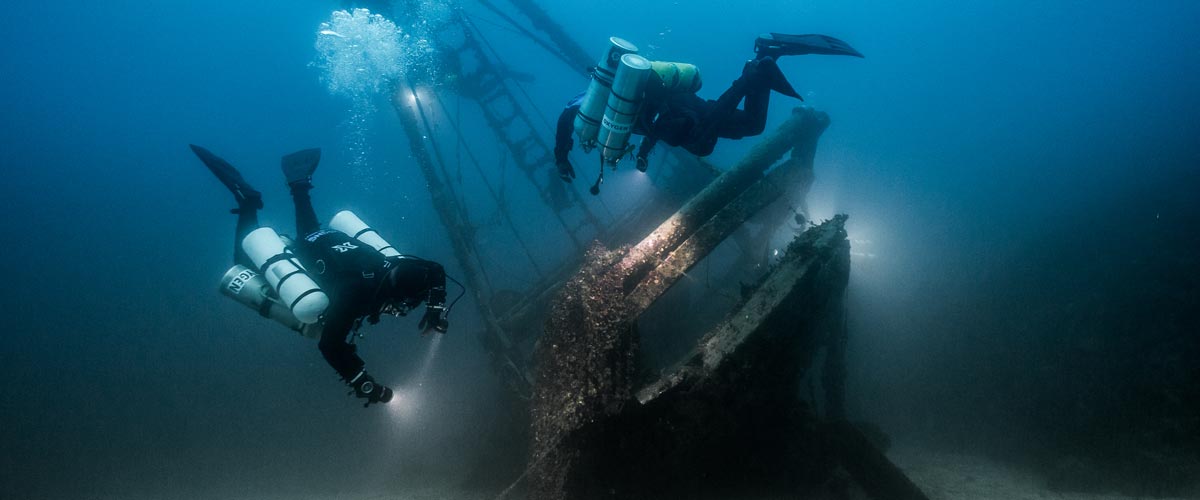
Strategies and procedures
Our strategies, those broad guiding lines tracing the path to follow, from how to approach planning to where, with what, and how we are willing to get there, will be more specific and more practical. Not because they magically become so, but because we will consciously and deliberately frame them that way.
We will establish clear, concise, and realistic procedures. Not only for the undesirable situations that may present themselves but also for those that are part of our dive objectives.
Even though, as technical divers, we often use equipment different from what we were previously accustomed to, it is essential to note that the gear does not make the diver. In a way, we could consider such equipment as the necessary tools to implement what our goal seeks to achieve, according to our strategies and procedures.
Technique plays an important role
We must put our greatest effort into learning and perfecting the different techniques we will be acquiring. Buoyancy, trim, propulsion, cylinder handling, deploying DSMBs and lift bags, valve drills, and more are essential skills we must begin to master to progress in our art. What we cannot do, when we need to do it, can harm us.
Our techniques must be effective and achieve the purpose for which they were devised. But they must also be efficient and require the least resources possible, including the time they take and the effort they demand. Effectiveness and efficiency will prevail over beauty and other considerations that may come to mind, although none of them should be mutually exclusive. A technique executed efficiently and effectively tends to have an inherent beauty.
Refining techniques is a lifelong mission. Some of them will be easy to master from the go; others, on the other hand, will be our life mission and will require many repetitions just to resemble the idea we have in mind of how they should be executed.
We must consider the environment
Our learning, the needs and musts of the practice we engage in, the experience we gradually gain, our strategies and procedures, and even our equipment and tools change with the environment.
Diving in the ocean, everything about us must be suitable for ocean dives. Conditions there rarely emulate those found in a pool, lake, or river. Variable winds and currents, greater depths, visibility conditions, other divers with uncertain skills around us, marine life, maritime traffic, distance from the coast, and many other factors add complexity and uncertainty.
It is never necessary to master the pool on the first day, but planning and aspiring to gradually cope with the ocean’s conditions is essential.
The cost of good training
We are aware that our resources are often scarce in relation to the possibilities of use we could give them if they were not. To a greater or lesser extent, we are part of the economic reality in which we are embedded.
Fortunately, the cost of good technical diver training is not an entry barrier. Comparing training and equipment costs, we see that the former are generally lower. Yes, lower cost for personalized service, essential to our future
performance and safety, than for a series of mass-produced products that are mere, albeit necessary, tools for an end.
The value of good training
The value of the training we received encompasses a range of characteristics, from emotional and methodological to technical and technological. TDI and its Introduction to Technical Diving course offer a deep and modern approach, with a teaching strategy that aims to create thinking divers, not merely obedient ones.
As technical divers, our knowledge is our primary tool. In this type of activity, what we don’t know can harm us.
Is this course optional?
Unfortunately, the fact that this Introduction to Technical Diving course is not a prerequisite for any subsequent training is an invitation to consider it optional. And we all know what usually happens to “optional” under budget constraints.
However, this course should be seen as optional only by those divers who are somehow familiar with the use of technical equipment, who have a mindset more in line with the requirements of this type of diving, who plan and execute the dives the proper “technical” way, who know their gas consumption rate, who are not intimidated by non-decompression tables, who feel comfortable using their dive computers, and know the techniques and have at least an acceptable level of buoyancy, positioning, and propulsion. Those can go straight to a more advanced training course, such as TDI’s Advanced Nitrox.
We must ask ourselves whether or not we are in that group.
Remember our goal: to have fun
Recreational diving is our passion. Jumping into the water carrying heavy equipment and having properly dotted our I’s and crossed our T’s have only one ultimate goal: fun. This is the activity we have chosen as a hobby. We must enjoy it; it must give us pleasure and make us vibrate.
Having a good time is not optional!
Blogs
Four opportunities to go pro in 2024 with Dive Friends Bonaire
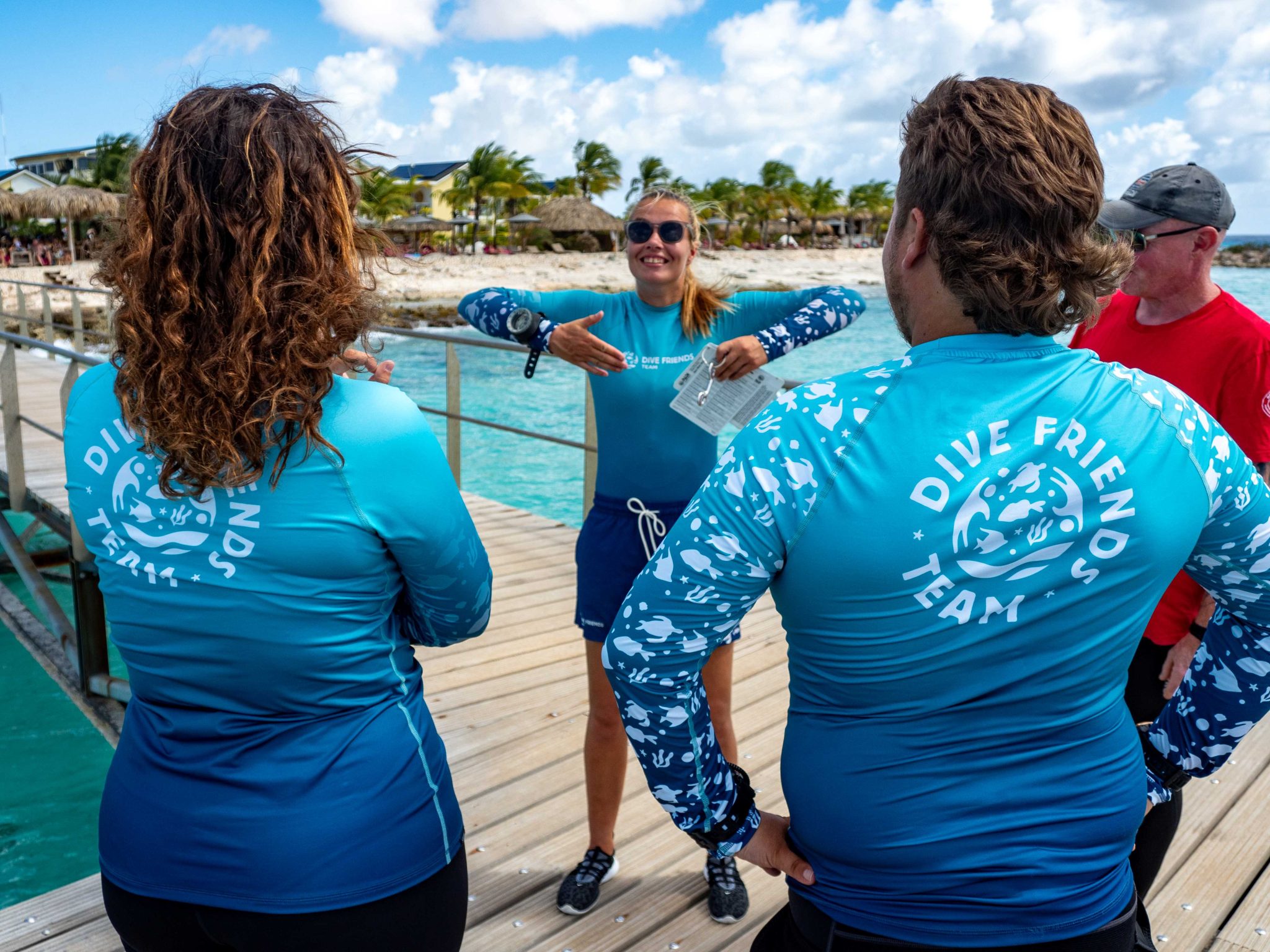
Dive Friends teaches the Instructor Development Course (IDC) several times a year to students who are eager to share their passion for diving with the world.
Dive Friends is known for the personal approach throughout the course. Their in-house course director will lead the students through every essential step, mentoring them to achieve their fullest potential as a dive instructor.
Applications for the following IDC start dates are now open:
- 12 April
- 5 July,
- 20 September
- 29 November
Partnership with Casita Palma
If the student opts for the IDC-Deluxe or IDC-Supreme package, their accommodation will be arranged for them at Casita Palma. This small and quiet resort is within walking distance from Dive Friends Bonaire’s main dive shop location and has everything you need to relax after an intense day of IDC training. Breakfast is included, so the student will always be fuelled and ready for their day.
Contact Dive Friends Bonaire’s Course Director Eddy for more information: coursedirector@divefriendsbonaire.com.
-

 News3 months ago
News3 months agoHone your underwater photography skills with Alphamarine Photography at Red Sea Diving Safari in March
-

 News3 months ago
News3 months agoCapturing Critters in Lembeh Underwater Photography Workshop 2024: Event Roundup
-

 Marine Life & Conservation Blogs2 months ago
Marine Life & Conservation Blogs2 months agoCreature Feature: Swell Sharks
-

 Blogs2 months ago
Blogs2 months agoMurex Resorts: Passport to Paradise!
-

 Blogs2 months ago
Blogs2 months agoDiver Discovering Whale Skeletons Beneath Ice Judged World’s Best Underwater Photograph
-

 Gear Reviews3 months ago
Gear Reviews3 months agoGear Review: Oceanic+ Dive Housing for iPhone
-

 Marine Life & Conservation2 months ago
Marine Life & Conservation2 months agoSave the Manatee Club launches brand new webcams at Silver Springs State Park, Florida
-

 News3 months ago
News3 months agoWorld’s Best Underwater Photographers Unveil Breathtaking Images at World Shootout 2023















